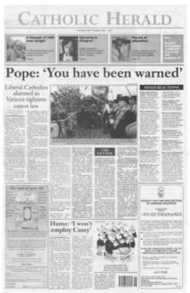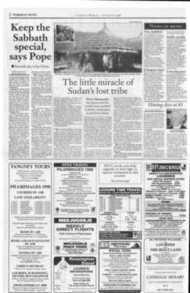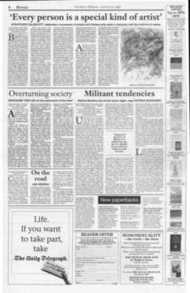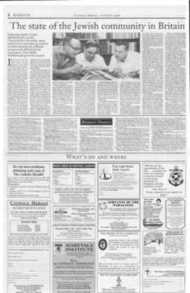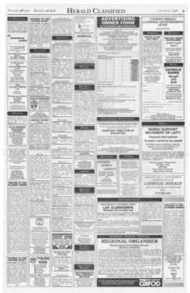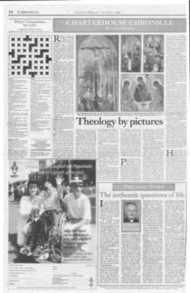Page 1, 10th July 1998
Page 1
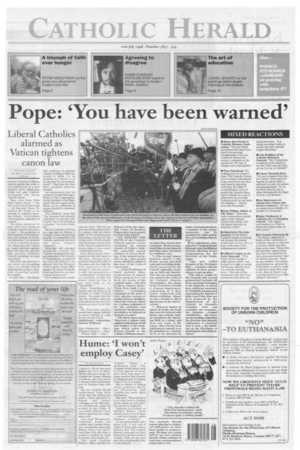
Report an error
Noticed an error on this page?If you've noticed an error in this article please click here to report it.
Tags
Share
Related articles
`a Defeat For Humanity'
Pope Reveals The Third Secret Of Fatima
Nunciature To Open In Beijing
Rome Stands Firm Against Gay Rights Lobby
Vatican Warns Against 'libertarian' Internet
Pon e: 'You have been warned'
Liberal Catholics alarmed as Vatican tightens canon law
BY LUKE COPPEN AND BRUCE JOHNSTON IN ROME LIBERAL. Catholics in Britain reacted angrily this week to the publication of a new apostolic letter, which they claim will gag Catholic theologians who favour Church reform.
They view Pope John Paul's latest decree — the first of two issued this week — Ad Tuendam Fidem (To Defend the Faith) as an attempt to suppress growing debate, particularly concerning the ordination of women.
The letter, issued on 30 June with tittle advanced warning, concerns the professio ftdei — the profession of faith required of all seminarians, and teachers at Pontifical universities. It is intended to close a loop-hole in canon law, which gives the Church no legal sanction against those who take the oath, but then question definitive Church teachings on faith and morals.
The Pope has inserted a new clause into the existing canon law giving Church authorities the power to discipline dissenting Catholic theologians.
It states that a theologian who continues to question Church teaching on faith and morals is liable "to be punished as a heretic or as an apostate by excommunication". They may also have their teaching authority revoked.
An explanatory note by Cardinal Joseph Ratzinger, Prefect of the Congregation for the Doctrine of the Faith, stated that the papal prohibition on the ordination of women should be considered definitive.
The Cardinal wrote that "the doctrine that priestly ordination is reserved only to men" was to be treated as a doctrine "set forth infallibly".
Liberal Catholics took this as a sign that the Vatican is seeking to silence the growing number of seminarians and Catholic university lecturers who favour women's ordination.
Although the changes specifically concern the Catholic teaching profession and prelature of the Church, by highlighting peripheral doctrines all Catholics are affected. But Tom Horwood of the Catholic Media Office insisted: "In terms of Catholic beliefs and doctrine, the letter contains nothing new."
Few in Britain have actually seen the letter. This has not prevented lively debate about its content, with the letters pages of the national press becoming a forum for the strong views of both liberals and conservatives in the wake of the decree's publication in Rome, where it has caused considerably less fuss.
Most Rome-based newspapers devoted little space to the letter. Vatican corespondent Orazio Petrosillo of Messeggero said that while the letter appeared to be an attempt to "turn the screws", it really only amounted to a "readjustment" of canon law on a question of faith and morals, which the Pope in any case held to be "immutable".
Only Turin-based La Stampa saw the letter as an attempt to stifle Church debate. The paper has ties with The Guardian, which last week played up the letter as a reactionary move by the Vatican.
The Pope later issued a second letter urging Catholics to respect Sunday as a day for rest and for Christ.
Additional reporting: Andrew M Brown Pope's Sunday plea — Page 2 Editorial Comment — Page 4 William Oddie — Page 5 Extracts from the Apostolic Letter, Ad Tuendam Fid' em, given matte proprio by Pope John Paul II: "TO DEFEND THE FAITH of the Catholic Church against errors springing up among certain of Christ's faithful, especially among scholars of sacred theology, it has seemed necessary to us... that certain norms should be added to the texts of the Code of Canon Law...
"....[Thej Profession of Faith includes three propositions or clauses whose purpose is to set forth the truths of the Catholic faith... The first of these clauses states: `With firm faith I also believe everything contained in the word of God, whether written or handed down in Tradition, which the Church, either by a solemn judgment or by the ordinary and universal Magisterium, sets forth to be believed as divinely revealed.'
"The third clause states: `Moreover I adhere with religious submission of will and intellect to the teachings which either the Roman Pontiff or the College of Bishops enunci
THE LETTER
ate when they exercise their authentic Magisterium, even if they do not intend to proclaim these teachings by a definitive act.'
"...The second clause, however, asserts: 'I also firmly accept and hold each and everything definitively proposed by the Church regarding teaching on faith and morals.' This has no corresponding canon in the Codes of the Catholic Church. Nevertheless, this clause of the Profession of Faith is of great importance, concerning as it does truths connected with divine revelation... Hence we have decided to fill in this lacuna in the universal law...
"...Whoever denies or places in doubt any truth that must be believed with divine and catholic faith, or repudiates the Christian faith as a whole, and does not come to his senses after having been legitimately warned, is to be punished as a heretic or or as an apostate by major excommunication; a member of the clergy, moreover, can be punished by other penalties, not excluding deposition."
• AN explanatory note, signed by Cardinal Joseph Ratzinger and Archbishop Tarcisio Bertone of the Congregation for the Doctrine of the Faith, states: "This new [1989] formula of the `Professio fidei'... concludes with the addition of three propositions or paragraphs.
"The object taught by this formula [the second proposition] includes all those teachings belonging to the dogmatic or moral area, which are necessary for faithfully keeping and expounding the deposit of faith, even if they have not been proposed by the Magisterium of the Church as formally revealed. One can consider, for example, the... doctrine ... of papal infallibility... the more recent teaching regarding the doctrine that priestly ordination is reserved only to men... the teaching on the illicitness of prostitution and of fornication."
MIXED REACTIONS
• Sister Myra Poole of Catholic Women's Ordination: "The fuel which precipitated this latest document is the growing strengthening of the new worldwide demand for women's ordination to the priesthood. The tide of change is now unstoppable."
• Piers Paul Read: "It's nothing new. It's common sense. The Catholic Church is by its nature authoritarian. It has survived for two thousand years by imposing orthodoxy. If it didn't it would fall apart. A lot of people who consider themselves Catholics in a sort of tribal sense are not really Catholics at all, by any sensible definition — they're more like Protestants."
• John Wilkins, Editor of The Tablet: "There has been a tremendous centralisation of the Catholic Church this century, and this papacy has been an extension of that."
• Editorial in The Independent: "Is the Pope a Catholic? Funny you should ask, because the answer would seem to be no. Not, at least, in the sense of allembracing and tolerant."
• Clifford Langley in the Daily Telegraph: "[The Pope] will not change a single person's mind not because he is right or wrong but because authority does not work like that any
more... The tone of [the document] is like that of an unwelcome letter from the Inland Revenue... It is simply shouting louder at people who have already stopped listening."
• Lala Winkley of the Catholic Women's Network: "My Catholicism is painted on the inside of my skin. Hove can the Pope tell me I'm not a Catholic?"
• Canon Timothy Russ: "No one is simply born into the Church. One enters by baptism in wlich faith is preferred (at least by parents and grandparents). So, in the Holy Church one is either dealingwith the finger of God or an illusion."
• Joe Mulrooney of Advent (for priests who decide to marry): "It's not accepting the possibility of a plurality of viewpoint."
• John Chatemor of Catholics for a Changing Church: "Tie clique surrounding the Pope in Rome have taken leave of their senses."
• Fr Francis Edwards SJ: "The Pope's authority is based on the conviction of Catholics that he is where he is because Christ put him there as his vicar. Those who feel that they carmot abandon their owr opinions for these pronouncements have an obvious renedy. There are any number of ecclesiastical institutions around the world which irould be ready to ask them vhat they want to do, then tel them to go on doing whaever it is while calling it Chritian."
blog comments powered by Disqus


